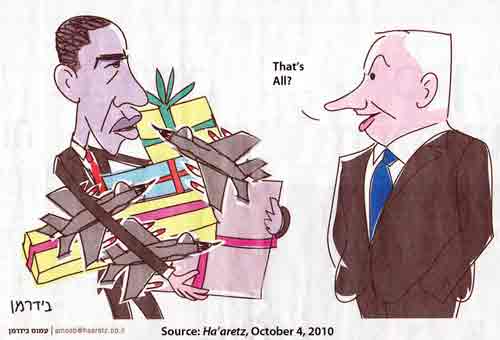Back to Square One
 Back to Square One—The Obama Administration Resets U.S. Policy
Back to Square One—The Obama Administration Resets U.S. Policy
Geoffrey Aronson
This article is taken from Settlement Report Vol. 20 No. 6, November-December 2010
[See previous postings Where now with the peace process? and The end of the “peace” talks]
Machiavelli famously cautioned kings to be bold and inflict pain early. President Barack Obama has indeed aspired to act courageously. His administration declared resolution of the Israel-Palestinian conflict to be a vital national security interest of the United States. In his June 4, 2009 Cairo speech Obama declared that “The United States does not accept the legitimacy of continued Israeli settlements. This construction violates previous agreements and undermines efforts to achieve peace. It is time for these settlements to stop.” His diplomacy showed an understanding that Israel’s policy of settlement construction is not a sideshow but rather the keystone of the ongoing, zero-sum battle for control of the land, and an issue of existential importance for Palestinians who have struggled for close to a century, with only marginal success in Gaza, to carve an island of sovereignty out of the rump of historical Palestine. This almost two year diplomatic effort to build a solid foundation for final status negotiations by winning meaningful concessions from Israel on settlement expansion has now been declared a failure by the administration itself.
[W]e have determined that a moratorium extension will not at this time provide the best basis for resuming direct negotiations. In the coming days and weeks, we will engage with both sides on the core substantive issues at stake in this conflict and with the Arab states and other international partners on creating a firm basis to work toward our shared goal of a framework agreement on all permanent status issues, a goal to which we and the parties remain committed.
State Department spokesman P.J. Crowley, December 8, 2010
A December 10 speech by Secretary of State Hillary Rodham Clinton offered an opportunity to “reset” U.S. policy which has focused on temporary reductions in settlement expansion. Noting that the continuing conflict “is at odds also with the interests of the United States,” she declared that, “It is time to grapple with the core issues of the conflict on borders and security; settlements, water and refugees; and on Jerusalem itself. And starting with my meetings this week, that is exactly what we are doing.”
Administration officials have often declared that the United States cannot want peace more than the parties themselves, but if there is a defining character to the diplomacy of the last few months, it is that Washington has demonstrated more of a commitment to diplomatic engagement than either of the antagonists. But as high as Obama’s aspirations have soared, his administration has failed to follow Machiavelli’s admonition that the successful establishment of a new order requires a necessarily painful transformation of the status quo. Notwithstanding its success in winning from Israeli prime minister Benjamin Netanyahu a rhetorical commitment to a Palestinian state, a limited 10-month settlement construction moratorium that ended in September, and now-lapsed planning limitations in East Jerusalem, the Obama administration has shied away from the kind of painful confrontation that is required to reverse the decades-long failure of the United States to end Israel’s illegitimate settlement effort.
The Obama administration has attempted to convince and entreat, rather than oblige Prime Minister Benjamin Netanyahu to rebel against his own political, personal, and familial history by placing effective and lasting constraints on settlement construction. The results of Washington’s effort have fallen woefully short of the spirit and the standard the administration itself set when, on May 27, 2009, Secretary of State Clinton explained , “With respect to settlements, the President was very clear when Prime Minister Netanyahu was here. He wants to see a stop to settlements—not some settlements, not outposts, not natural growth exceptions. . . . That is our position.”
The Obama administration failed to gauge correctly the depth and intensity of Israel’s commitment to settlement expansion, especially in East Jerusalem. And so it has been repeatedly surprised and outmaneuvered when confronted with this fact—when, for example, Netanyahu successfully parried the new administration’s initial demand for a complete freeze, and more recently, when, in November 2010, Netanyahu rejected an unprecedented package of incentives aimed at moving diplomacy beyond a short-lived settlement moratorium, a decision that pushed the administration to declare an end to its settlement freeze initiative.
The Latest Maneuvering
During the period since the end of the 10-month suspension of new construction starts in late September 2010, work has begun on more than 1,500 new settlement units throughout the West Bank, both east and west of the separation barrier (see chart page 5). As a result, during 2010, the number of new construction starts will not deviate markedly from the historical average. In other words, the 2010 settlement moratorium failed to make a difference on the ground or to build confidence between the parties—the twin objectives that the Obama administration initially embraced. Indeed, as pursued by Washington, the placement of a settlement freeze at the center of its diplomatic effort has reduced confidence between the parties and produced two years of debilitating diplomatic stalemate.
Each one of these guarantees and undertakings is more dangerous and worse than the issue of settlements. While continuing Israeli settlement activity is undoubtedly bad, it is not as serious and threatening as these American guarantees and undertakings. Let us consider the issue of keeping an Israeli security presence in the Jordan Valley: The Israelis want to keep their army in that area for decades. What sovereignty would a Palestinian state enjoy when it is hemmed in by Israeli troops on all sides? What is even more serious is that these U.S. guarantees are preventing us from internationalizing the problem, which is one of the few tools we have in our hands.
I hope that what I am saying is not reported in a way that appears as if I am not against settlements. On the contrary. All these guarantees were given in the hope that Netanyahu would extend his moratorium by two months, which in any case does not include Jerusalem or the major settlement blocks. This is nonsense, and we reject it completely.
Palestinian prime minister Salam Fayyad, Sharq al Awsat, November 15, 2010
In East Jerusalem, although excluded from the moratorium, American pressure in the wake of Vice President Joseph Biden’s March 2010 visit resulted in the temporary postponement of numerous planning efforts there. These constraints are only now being partially lifted, with announcements in November of planning progress on new construction in Har Homa (1,000 units), Ramot (300 units), Pisgat Ze’ev (655 units), and Gilo (130 units), along with the critical extension of the Begin ring road south to the Tunnels Road leading to the Etzion bloc. Obama decried these Israeli moves, highlighting both his interest and his ineffectiveness—keeping settlements in the international spotlight even as his administration hoped to “move beyond the settlement freeze” to a resumption of direct talks. The president’s December 7 decision to abandon this policy has also suspended U.S. efforts to focus on the resumption of direct Israel-Palestinian negotiations.
At least since the publication of the Mitchell Commission’s report in May 2001, a settlement freeze, including “natural growth,” has been a key weapon in the arsenal of American and international peacemakers. No longer. The Obama administration’s failure to negotiate such a freeze is the latest in an unbroken string of unsuccessful U.S. efforts: Israel’s commitment to President Jimmy Carter not to establish new settlements was undercut by Prime Minister Menachem Begin after the 1978 Camp David summit; Prime Minister Yitzhak Rabin’s “new order of priorities” after his 1992 election offered no respite from continuing settlement expansion during the Oslo era to accommodate “natural growth”; the establishment since 1996 of more than 100 new settlements (re-branded as “outposts”) violates a long-standing Israeli pledge not to establish new settlements.
A Stillborn Freeze
The Obama administration’s initial effort to impose a blanket settlement freeze faltered in July 2009 over construction plans at the East Jerusalem site of the Shep-herd’s Hotel and never recovered. More recently, after the expiration of the initial moratorium in Septem-ber, Washington tried unsuccessfully to restart direct negotiations by winning Israel’s agreement to a renewed construction moratorium (reportedly including all construction that commenced since expiration of the original moratorium) for three months “according to the format of the previous moratorium” (that is, excluding East Jerusalem). It reportedly offered Israel a package of incentives including a promise of backing at the United Nations, a multi-billion dollar provision of top-of-the-line F35 aircraft, and U.S. support for long-term Israeli security control of the Jordan Valley. Administration officials deny any U.S.-Israeli agreement on the Jordan Valley. But Washington made no public accounting of the elements under discussion, adding to the lack of clarity.
Palestinians decry Obama’s inability to place effective constraints on settlement expansion. They remain opposed to resuming direct talks with Israel as long as a construction moratorium excludes East Jerusalem even as they consider broadening a diplomatic offensive against continuing occupation. Of even greater concern however, are the very elements of the aborted American package offered to Israel that suggested an Israeli-American understanding on the territorial and diplomatic outlines of a final status agreement.
Palestinian prime minister Salam Fayyad has recently noted that “settlement activity is totally unacceptable, and even its freeze is unacceptable to us.” In a meeting with journalists reported by al-Hayat on November 13, Fayyad said that the U.S. guarantees reportedly offered to Israel “are more dangerous and worse” than continuing settlement. In this regard, he referred specifically to the call for “keeping the Israeli presence in the [Jordan]Valley area for decades.” In addition, Fayyad criticized the promise to Israel of U.S. diplomatic cover in international institutions. “What is more dangerous,” Fayyad said, “is the [U.S.] guarantees to obstruct the [Palestinian and Arab] ability to internationalize the issue” and move it to the United Nations General Assembly or the Security Council.
Next Steps
The Israeli cabinet, for its part, refused to consider the American offer discussed in early November between Netanyahu and Secretary of State Hilary Clinton, in part because of the ambiguity surrounding Jerusalem construction, but more fundamentally because of Netanyahu’s reluctance to endorse a process aimed at seriously addressing final status issues. Netanyahu’s original game plan was to survive Obama’s diplomatic initiatives for two years until congressional elections and a hoped-for Republican comeback that would weaken Washington’s ability to confront Israel. In extraordinary remarks, Republican representative Eric Cantor promised to do just that. In a November 11 meeting with Netanyahu, Cantor, according to a press release issued by his office, “stressed that the new Republican majority will serve as a check on the Administration. . . . He made clear that the Republican majority understands the special relationship between Israel and the United States, and that the security of each nation is reliant upon the other.”
After almost two years of energetic but stillborn diplomacy, the Obama administration has been unable to make progress on ending the occupation and creating a Palestinian state at peace with Israel. The president’s attempt to rein in settlement expansion and his effort to place settlements at the heart of a negotiated end to the Israel-Palestinian conflict have failed. As Obama surveys the future, he might recall Machiavelli’s wise counsel, “He who wishes to be obeyed must know how to command.”


